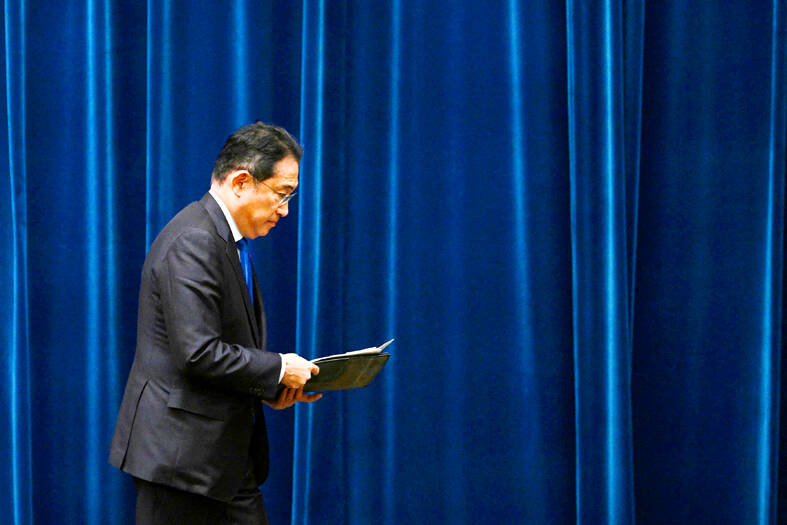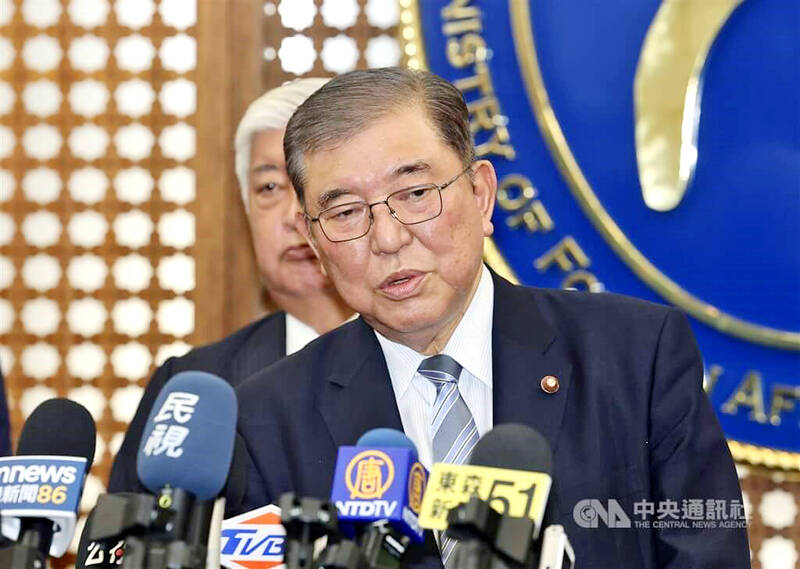Japanese Prime Minister Fumio Kishida yesterday announced that he would not run in next month’s party leadership vote, paving the way for Japan to have a new prime minister.
Kishida was elected president of his governing Liberal Democratic Party (LDP) in 2021 and his three-year term expires next month. Whoever wins the party vote would succeed him as prime minister, as the LDP controls both houses of parliament.
Kishida said that he would support the new leader.

Photo: Reuters
“We need to clearly show an LDP reborn,” Kishida told a news conference. “In order to show a changing LDP, the most obvious first step is for me to bow out.”
“I will not run for the upcoming party leadership election,” he said.
Kishida has faced dwindling support ratings, which have dipped below 20 percent.

Photo: CNA
To achieve policies to tackle difficult situations in and outside Japan, regaining public trust in politics is crucial, Kishida said.
He called on aspiring party lawmakers to raise their hands to run for leadership and debate policies during the campaign.
“Once a new leader is decided, I hope to see everyone unite and form a dream team to achieve politics that can gain public understanding,” he said.
Kishida said he has been mulling his possible resignation for some time but waited until he could put his key policies on track, including an energy policy that calls for a return to nuclear power, a military buildup to deal with security threats in the region, and improving ties with South Korea, as well as political reforms.
Speculation on potential candidates has landed on a number of senior LDP lawmakers, including party Secretary-General Toshimitsu Motegi, Minister of Digital Affairs Taro Kono, Minister of Economic Security Sanae Takaichi and Minister of Foreign Affairs Yoko Kamikawa.
In Taipei, former Japanese minister of defense Shigeru Ishiba said that he is willing to run for prime minister if he gets enough support from the party.
The 67-year-old Ishiba had run for LDP leadership four times before.
Asked if he was interested in running again, Ishiba, who is in Taiwan on a three-day trip, told reporters that he was open to the idea.
Speaking through an interpreter, Ishiba said he would need the support of at least 20 of the 371 LDP members in the two parliamentary chambers to make a run for LDP chief.
Asked if Japan would defend Taiwan if war were to break out in the Taiwan Strait, Ishiba said the top priority for Tokyo was to make sure such a scenario would never happen.
He also said that Japan’s possible responses to a cross-strait conflict were not something that should be shared publicly at a press event.
Ishiba is leading a group of six cross-party Diet members focused on security issues on a visit to Taiwan that was to end later yesterday.
Additional reporting by CNA

INVESTIGATION: The case is the latest instance of a DPP figure being implicated in an espionage network accused of allegedly leaking information to Chinese intelligence Democratic Progressive Party (DPP) member Ho Jen-chieh (何仁傑) was detained and held incommunicado yesterday on suspicion of spying for China during his tenure as assistant to then-minister of foreign affairs Joseph Wu (吳釗燮). The Taipei District Prosecutors’ Office said Ho was implicated during its investigation into alleged spying activities by former Presidential Office consultant Wu Shang-yu (吳尚雨). Prosecutors said there is reason to believe Ho breached the National Security Act (國家安全法) by leaking classified Ministry of Foreign Affairs information to Chinese intelligence. Following interrogation, prosecutors petitioned the Taipei District Court to detain Ho, citing concerns over potential collusion or tampering of evidence. The

NEGOTIATIONS: The US response to the countermeasures and plans Taiwan presented has been positive, including boosting procurement and investment, the president said Taiwan is included in the first group for trade negotiations with the US, President William Lai (賴清德) said yesterday, as he seeks to shield Taiwanese exporters from a 32 percent tariff. In Washington, US Trade Representative Jamieson Greer said in an interview on Fox News on Thursday that he would speak to his Taiwanese and Israeli counterparts yesterday about tariffs after holding a long discussion with the Vietnamese earlier. US President Donald Trump on Wednesday postponed punishing levies on multiple trade partners, including Taiwan, for three months after trillions of US dollars were wiped off global markets. He has maintained a 10 percent

TRADE: The premier pledged safeguards on ‘Made in Taiwan’ labeling, anti-dumping measures and stricter export controls to strengthen its position in trade talks Products labeled “made in Taiwan” must be genuinely made in Taiwan, Premier Cho Jung-tai (卓榮泰) said yesterday, vowing to enforce strict safeguards against “origin laundering” and initiate anti-dumping investigations to prevent China dumping its products in Taiwan. Cho made the remarks in a discussion session with representatives from industries in Kaohsiung. In response to the US government’s recent announcement of “reciprocal” tariffs on its trading partners, President William Lai (賴清德) and Cho last week began a series of consultations with industry leaders nationwide to gather feedback and address concerns. Taiwanese and US officials held a videoconference on Friday evening to discuss the

PERSONAL DATA: The implicated KMT members allegedly compiled their petitions by copying names from party lists without the consent of the people concerned Judicial authorities searched six locations yesterday and questioned six people, including one elderly Chinese Nationalist Party (KMT) member and five KMT Youth League associates, about alleged signature forgery and fraud relating to their recall efforts against two Democratic Progressive Party (DPP) legislators. After launching a probe into alleged signature forgery and related fraud in the KMT’s recall effort, prosecutors received a number of complaints, including about one petition that had 1,748 signatures of voters whose family members said they had already passed away, and also voters who said they did not approve the use of their name, Taipei Deputy Chief Prosecutor